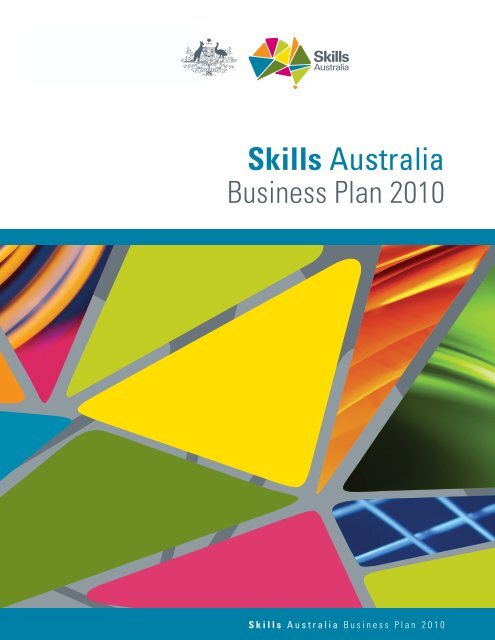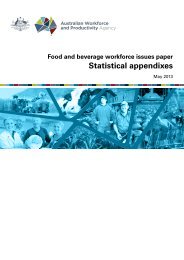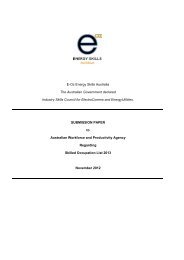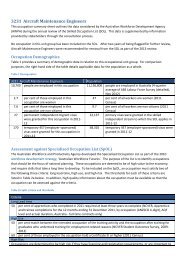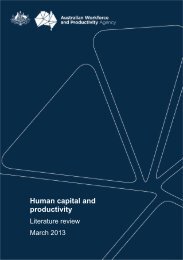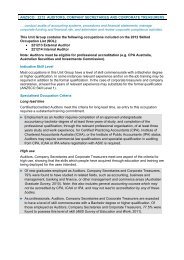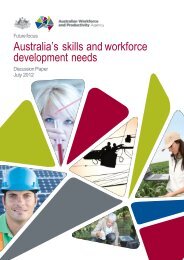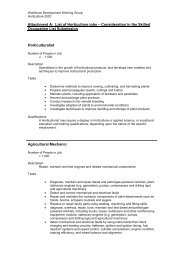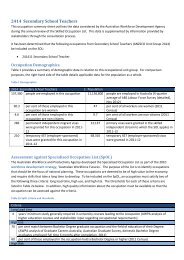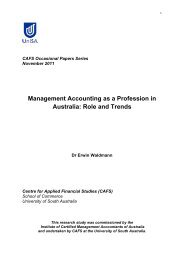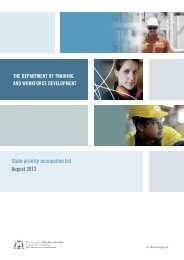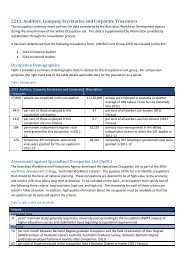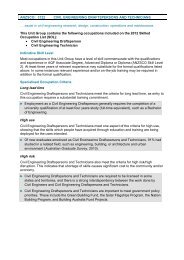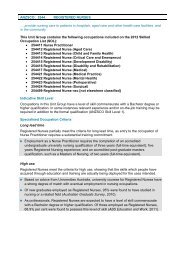Skills Australia - AWPA
Skills Australia - AWPA
Skills Australia - AWPA
You also want an ePaper? Increase the reach of your titles
YUMPU automatically turns print PDFs into web optimized ePapers that Google loves.
<strong>Skills</strong> <strong>Australia</strong><br />
Business Plan 2010<br />
S k i l l s A u s t r a l i a B u s i n e s s P l a n 2 0 1 0
Introduction<br />
When <strong>Skills</strong> <strong>Australia</strong> was established in April 2008 it was in the context of skills shortages and concerns<br />
about inflationary pressures on wages. The demand for skills and labour was particularly strong in the<br />
construction and resources sector.<br />
The forums held with Industry <strong>Skills</strong> Councils in August and September 2008 repeatedly relayed stories<br />
of skills and labour shortages and in many cases the struggle to compete with the attractive wages<br />
offered in the resources sector.<br />
The Global Financial Crisis changed everything; this was particularly evident from October 2008 until late<br />
2009.<br />
Now as we enter 2010 we have almost come full circle. In the medium and longer term we face the<br />
prospect of a re-emergence of demand for skills in the resources sector, to support the major projects<br />
that are planned especially in Western <strong>Australia</strong> and Queensland.<br />
Across the economy, the issue of the ageing workforce and the need to replace skills continues to loom<br />
as a significant challenge as has been highlighted in the latest Intergenerational Report.<br />
In terms of our capacity to deliver on these future skills needs, we are aware that the effects of the<br />
downturn have been uneven affecting some sectors, regions and groups of people more adversely than<br />
others. The Global Financial Crisis posed significant risks to skills development especially in relation<br />
to the number of new and existing apprenticeships in particular industries, which has implications for<br />
the future engagement of individuals and skills in the economy. It appears that the swift response<br />
by government and industry to mitigate the risks has helped to retain apprenticeship numbers at an<br />
aggregate level, an outcome that is welcomed in terms of ensuring <strong>Australia</strong> has the skills it requires to<br />
maximise the opportunities that arise as the economy recovers.<br />
This Business Plan builds on the strategic direction and objectives established by <strong>Skills</strong> <strong>Australia</strong> in 2009<br />
and sets out the priorities and activities that <strong>Skills</strong> <strong>Australia</strong> will undertake in 2010 in order to achieve<br />
those objectives.<br />
In the context of continuing to build on our previous work, the policy paper <strong>Australia</strong>n Workforce Futures<br />
will significantly influence the board’s work program for the next 12 months and possibly beyond.<br />
<strong>Skills</strong> <strong>Australia</strong> has either direct responsibility or will take a leadership role to implement a number of<br />
the recommendations arising from <strong>Australia</strong>n Workforce Futures. It will also continue to collaborate<br />
with governments, industry and education and training providers to encourage and assist in the<br />
implementation of the necessary actions and reform agenda.<br />
In March 2009 <strong>Skills</strong> <strong>Australia</strong>’s remit was expanded to include providing advice to government on skills<br />
needs for the higher education sector. It was expanded again in February 2010 to provide advice on a<br />
skilled occupation list for migration purposes.<br />
In both cases the expanded remit fits with <strong>Skills</strong> <strong>Australia</strong>’s vision and mission and helps to ensure a<br />
more coordinated approach by bringing a range of activities that are aimed at ensuring <strong>Australia</strong>’s future<br />
productivity under the workforce development umbrella.<br />
2
Vision<br />
The vision of <strong>Skills</strong> <strong>Australia</strong> is that <strong>Australia</strong>’s skills and workforce development needs are<br />
anticipated and met and that skills are utilised to secure a prosperous and productive future.<br />
Mission<br />
The mission of <strong>Skills</strong> <strong>Australia</strong> is to provide independent and high quality advice to ensure the<br />
government’s investment in education and training promotes the development of a highly skilled<br />
workforce, increases workforce participation (especially among less advantaged groups), meets<br />
the needs of industry and increases <strong>Australia</strong>’s productivity.<br />
<strong>Skills</strong> <strong>Australia</strong>’s advice covers a broad range of areas that affect the demand for and supply of<br />
skills, including (but not limited to), migration, the tertiary education system and the effective use<br />
of skills in the workplace.<br />
Our Values<br />
<strong>Skills</strong> <strong>Australia</strong>’s advice and operations will be underpinned by the following values:<br />
Leadership We will take the strategic perspective to achieve outcomes that strive to the<br />
aspiration to have the best educated, best skilled workforce in the world. We will provide<br />
leadership, face challenges and tackle the difficult issues in the interest of increasing productivity<br />
and delivering benefits to individuals and the nation.<br />
Commitment We support a training system that delivers knowledge and skills of high quality<br />
that can be useful and used. We are committed to a nationally based system of recognised<br />
competencies to meet the needs of industry and support mobility of skills and a framework that<br />
provides ease of access for users to engage with the system.<br />
Respect and Inclusiveness We aim to build relationships with our stakeholders based on trust<br />
and collaboration. We will act as an honest broker, listening to the views of all stakeholders. We<br />
will respect different views, act with integrity, openness and honesty, be fair and credible, and<br />
share knowledge and information.<br />
Flexibility We will provide advice to support reform of the national training system where it is<br />
needed and will be willing to change and continuously improve our actions through a learning<br />
approach.<br />
Evidence based approach We will conduct and commission research that complements our<br />
objectives and will provide advice based on critical analysis and sound evidence.<br />
Public interest Our advice will aim to ensure that education and training is directed to those<br />
areas that best address the public interest in supporting productivity improvement, increasing<br />
workforce participation, lifting the capacity of individuals to participate in the workforce now and<br />
to adapt to the future challenges arising from technological and other changes.<br />
3
Objectives<br />
The strategic priorities and objectives of the work of <strong>Skills</strong> <strong>Australia</strong> as set out below are primarily<br />
defined by the <strong>Skills</strong> <strong>Australia</strong> Act 2008. They are also informed by the recommendations arising from the<br />
major work undertaken by <strong>Skills</strong> <strong>Australia</strong> over the last 12 months such as Foundations for the Future,<br />
the Strategic Industry Forum, <strong>Australia</strong>n Workforce Futures and work currently on hand.<br />
• Develop advice and strategies on workforce development and the application of skills in the workplace<br />
to improve productivity.<br />
• Analyse current and emerging skill needs in the <strong>Australia</strong>n economy. Provide the Government with<br />
recommendations on current and future skill needs.<br />
• Assess evidence from commissioned research and industry stakeholders to inform <strong>Australia</strong>’s<br />
workforce development needs.<br />
• Widely distribute information from research and consultations so stakeholders have the necessary<br />
information to inform their training and employment decisions.<br />
• Provide and drive ongoing reforms to the education and training sector, including priorities for the<br />
investment of funds.<br />
• Establish and maintain relationships with relevant state bodies and authorities to inform our advice<br />
and facilitate alignment of responses.<br />
4
Our Stakeholders<br />
<strong>Skills</strong> <strong>Australia</strong> aims to provide advice on the skills and workforce development needs of the <strong>Australia</strong>n<br />
economy ranging from unskilled to professional.<br />
The success of the outcomes we are seeking relies on fostering cooperative working relationships<br />
with a broad range of people and organisations that share an interest in workforce development needs<br />
including but not limited to:<br />
• The Minister for Education, Employment and Workplace Relations<br />
• Industry as represented by Industry <strong>Skills</strong> Councils, professional associations, peak bodies, business<br />
and employee representatives<br />
• States and Territories and the relevant training authorities and through them the industry advisory<br />
bodies within each jurisdiction<br />
• Individuals and employers accessing education and training<br />
• Providers of education and training including both vocational and higher education<br />
• Commonwealth government agencies<br />
• Research organisations<br />
• Intermediaries such as job services providers, career advisory services and group training<br />
associations.<br />
In addition, the board recognises that while the development of human capital is a crucial factor<br />
in <strong>Australia</strong>’s competitiveness, knowledge for its own sake does not represent the most effective<br />
investment of training resources. Hence, the economic imperative underlying the work of <strong>Skills</strong><br />
<strong>Australia</strong> is to ensure that the skills and knowledge delivered by the education and training system are<br />
used and useful. This is why the role of industry is critical to ensuring skills are used effectively. <strong>Skills</strong><br />
<strong>Australia</strong>’s relationship with industry is primarily through the peak industry associations, the Industry<br />
<strong>Skills</strong> Councils, Professions <strong>Australia</strong>, the individual professional associations and the peak education and<br />
training representatives.<br />
5
Strategic Priority 1:<br />
Analyse current and emerging skills needs in the <strong>Australia</strong>n economy. Provide<br />
the Government with recommendations on current and future skills needs.<br />
Rationale<br />
<strong>Skills</strong> <strong>Australia</strong> has identified that <strong>Australia</strong> requires a highly skilled population to maintain and improve<br />
its economic position in the face of increasing global competition. The number of jobs that require higher<br />
skills continues to increase and the number of low skills jobs is declining. We need strategies in place to<br />
both increase and deepen skills for the future and to manage the approach for those skills that are highly<br />
specialised.<br />
• More needs to be done to increase the participation of domestic students in VET, otherwise<br />
<strong>Australia</strong> risks a lack of skilled workers to meet future growth and replacement demand.<br />
• As the university sector moves to a student demand based system it will be important to<br />
monitor the take up of university courses and identify potential gaps in specialised skills.<br />
Actions for <strong>Skills</strong> <strong>Australia</strong><br />
• Develop a process for working in consortia with industry stakeholders and professional associations,<br />
equity organisations and others to develop Industry Strategic Outlooks. The outlooks will examine<br />
issues of supply and demand of skills and advise on interventions for the Specialised Occupations List<br />
to address skills shortages or surpluses.<br />
• Develop processes that enable <strong>Skills</strong> <strong>Australia</strong> to obtain sophisticated industry intelligence about new<br />
and emerging skills needs biannually.<br />
• Evaluate and report on the investment in education and training.<br />
• Research and advise on strategies to increase individuals demand and participation in education<br />
particularly for older workers.<br />
• Research supply side issues, in particular, how to overcome barriers to individuals taking up education<br />
and training.<br />
• Continue to work with stakeholders on broad workforce planning activity and to address issues such<br />
as the role and limitation of using ANZSCO in providing advice on skills needs.<br />
6
Deliverables<br />
• Publish the revised Specialised Occupations List on an annual basis.<br />
• Provide advice in regards to a Skilled Occupation List for migration.<br />
• Publish Industry Outlooks and strategies for intervention to inform models of best practice for<br />
workforce development.<br />
• Report on tertiary education sector enrolments, graduations and demand – with analysis against the<br />
Specialised Occupations List.<br />
• Contribute to DEEWR’s review of the Productivity Places Program.<br />
• Commence development of scenario work for 2012 review of future skills needs.<br />
• Develop alternatives to address the data limitations in understanding and advising on skills needs.<br />
• Publish research on factors effecting demand from individuals including best practice.<br />
7
Strategic Priority 2:<br />
Develop advice and strategies on workforce development and the application<br />
of skills in the workplace to improve productivity.<br />
Rationale<br />
<strong>Australia</strong>’s economic competitiveness rests on the productivity of its workforce. <strong>Australia</strong>n Workforce<br />
Futures identified the need to better utilise skills as a critical element of future productivity. It has also<br />
noted the potential of programs designed to assist business management and productivity such as<br />
Enterprise Connect to be better aligned with the workforce development agenda. To do this would act<br />
as a mechanism for engaging employers, particularly from small and medium enterprise in strategies for<br />
improved management, innovation and employee engagement.<br />
• <strong>Australia</strong>n Workforce Futures found that approximately 30 per cent of employees perceive that<br />
they do not use the skills they possess.<br />
• Research by the United Kingdom Commission on Employment and <strong>Skills</strong> (UKCES) has<br />
examined how a High Performance Working (HPW) approach can help to ensure skills are<br />
better used in the workplace. The research finds that there is a weight of evidence pointing to<br />
the positive link between HPW, performance and employee wellbeing.<br />
Achieving better application of skills in the workplace requires a holistic approach and is an extremely<br />
difficult and complex thing to achieve and get right. There is no silver bullet or process to follow and<br />
there can be a significant time lag before the benefits can be totally realised.<br />
Whilst it is noted that employers control their own organisations and businesses there is a role for public<br />
policy in encouraging employers to adopt HPW and other improvement strategies.<br />
Actions for <strong>Skills</strong> <strong>Australia</strong><br />
• Make the case for change – by demonstrating the business case to employers. Identify best practice<br />
in <strong>Australia</strong> and internationally and promote these examples through industry and professional<br />
associations, HR and management networks.<br />
• Encourage businesses to take action – Inspire employers to think about how they manage their<br />
organisations and staff. Stimulate enterprises to act by raising awareness and providing guidance<br />
on how they could do things differently to improve their productivity, competitive advantage and<br />
employee engagement.<br />
• Link in with other policy initiatives in <strong>Australia</strong> for example, the Society of Knowledge Economics<br />
project on High Performance Workplaces and learn from international research and activities that aim<br />
to improve the use of skills in the workplace.<br />
• Pursue implementation of recommendations from <strong>Australia</strong>n Workforce Futures to link funding<br />
through government programs such as the Productivity Places Program and Enterprise Connect<br />
to coordinate business management and the development of plans for application of skills in the<br />
workplace.<br />
8
• Equip education and training providers and other intermediaries to undertake training needs analysis<br />
for businesses and through this role facilitate workforce development and improved productivity.<br />
• Provide specific advice on reforms to the VET system such as incentives and performance measures<br />
to encourage an enterprise focus.<br />
Deliverables<br />
• Host a major conference/convention on use of application of skills jointly with business partners,<br />
industry and education and training providers.<br />
• Promote better application of skills in the workplace via case studies of best practice. The case studies<br />
will aim to raise awareness and educate managers and individuals on the value and mechanisms for<br />
improving the use of skills in the workplace. Articles will be published in industry, HR magazines and<br />
other relevant publications to raise awareness and generate interest in better utilisation of skills in the<br />
workplace.<br />
• Lead a new partnership approach to workforce development at government, industry and enterprise<br />
level.<br />
• Provide advice on ‘enterprise responsive’ training programs to encourage better application of skills<br />
• Raise the capacity of providers to work with businesses including by coordinating with current<br />
business development programs, to provide training needs analysis with a view to improving the<br />
productivity of the business and engagement of employees.<br />
9
Strategic Priority 3:<br />
Assess evidence from commissioned research and industry stakeholders to<br />
inform <strong>Australia</strong>’s workforce development needs.<br />
Rationale<br />
This priority supports <strong>Skills</strong> <strong>Australia</strong>’s values of: providing advice based on an evidenced based<br />
approach; and ensuring that its advice works to ensure that education and training effort is directed to<br />
those areas that best address the public interest, support productivity and the participation of individuals<br />
in education and work.<br />
Actions for <strong>Skills</strong> <strong>Australia</strong><br />
• Conduct and commission research that supports <strong>Skills</strong> <strong>Australia</strong>’s business priorities.<br />
• Identify opportunities to collaborate with other organisations on research where appropriate, including<br />
both within <strong>Australia</strong> and internationally.<br />
• Provide advice on the outcomes and application of training.<br />
• Research priorities for the coming year include:<br />
»»<br />
The application of skills in the workplace.<br />
»»<br />
Examination of completion rates – why they are low and how to improve them.<br />
»»<br />
<strong>Skills</strong> for the new economy including the green economy and new technology.<br />
Deliverables<br />
• Research findings will be published on the <strong>Skills</strong> <strong>Australia</strong> website.<br />
• Research findings will be disseminated through presentations, industry forums and other media.<br />
10
Strategic Priority 4:<br />
Widely distribute information from research and consultations so stakeholders<br />
have the necessary information to inform their training and employment<br />
decisions.<br />
Rationale<br />
Information is critical in assisting individuals and industry to make informed decisions about their<br />
involvement and investment in training. <strong>Skills</strong> <strong>Australia</strong> will publish findings of its skills and workforce<br />
development research to assist education, training and employment decisions.<br />
Actions for <strong>Skills</strong> <strong>Australia</strong><br />
• Publish research conducted by <strong>Skills</strong> <strong>Australia</strong>, as appropriate, via the <strong>Skills</strong> <strong>Australia</strong> website and<br />
through messages delivered by the Chair of <strong>Skills</strong> <strong>Australia</strong> at presentations, industry forums and<br />
through other media.<br />
• Provide advice on the options to better inform the general public of outcomes delivered by quality<br />
training and training providers to enable them to make informed decisions in a competitive training<br />
market.<br />
• Conduct research to examine opportunities to facilitate a workforce development approach through<br />
partnerships of training providers, industry and firms at the local level to promote the use of skills in<br />
enterprises.<br />
• Examine opportunities for partnerships with training providers, industry associations and enterprises<br />
to promote the use of skills.<br />
Deliverables<br />
• Updated communications and stakeholder strategy.<br />
• Research published on the website.<br />
• Presentations and briefings focus on promoting key messages.<br />
• Articles will be published in a broad range of media.<br />
11
Strategic Priority 5:<br />
Provide and drive ongoing reforms to the education and training sector,<br />
including on priorities for the investment of public funds.<br />
Rationale<br />
<strong>Australia</strong>n Workforce Futures provides a macro approach to identifying the need for more and deeper<br />
skills, and improvements in productivity, participation, language, literacy and numeracy and the use<br />
of skills in the workplace. <strong>Skills</strong> <strong>Australia</strong>’s work on the VET system will focus on the opportunities<br />
and barriers in VET and will make recommendations to improve the system to ensure it is well placed<br />
to meet the objectives outlined in <strong>Australia</strong>n Workforce Futures. This work will both articulate the<br />
contemporary VET offer and advise on the fundamental aspects of the system that require reform. <strong>Skills</strong><br />
<strong>Australia</strong> will look at the industry, social and community context as the VET system is more than just<br />
providers.<br />
Actions for <strong>Skills</strong> <strong>Australia</strong><br />
• Conduct and commission research to inform <strong>Skills</strong> <strong>Australia</strong>’s work on the VET system to ensure a<br />
better deal for learners, high quality teaching and learning and a broader remit of VET.<br />
• Draft advice and recommendations in consultation with people who have expertise and understanding<br />
of the sector.<br />
• Liaise with key stakeholders to test the ideas and develop stakeholder buy-in to the process.<br />
• Review other policy proposals being pursued by government agencies and others that align with the<br />
objectives of the VET roadmap.<br />
• Participate in the review of the Productivity Places Program National Partnership.<br />
• Monitor and follow up implementation of recommendations outlined in Foundations for the Future.<br />
• Promote and monitor implementation of recommendations contained in <strong>Australia</strong>n Workforce Futures.<br />
Deliverables<br />
• Complete a report on <strong>Skills</strong> <strong>Australia</strong>’s work on the VET system by June 2010.<br />
• Publish analysis of key data and trends of the education and training system based on international<br />
comparisons.<br />
12
Strategic Priority 6:<br />
Establish and maintain relationships with relevant state bodies and authorities<br />
to inform our advice and facilitate alignment of responses to skills needs.<br />
Rationale<br />
There is a broad and diverse range of stakeholders who have an interest and role in the operation<br />
and outcomes of the tertiary education and training systems. The systems should meet the needs of<br />
industry, individuals, and economic development on a regional, national and international basis. Often<br />
providers have extensive knowledge and information about skills needs in their local area.<br />
<strong>Skills</strong> <strong>Australia</strong> recognises that its advice needs to be relevant to the broad stakeholder network and its<br />
efforts to establish relationships and engage stakeholders across jurisdictions, industry and enterprises<br />
have enhanced the relevance and acceptance of its advice on skills and workforce development.<br />
Throughout 2010 the focus will be to maintain the good working relationships and broaden the network<br />
to engage on an international level to share learning with other organisations that have a similar mandate<br />
to <strong>Skills</strong> <strong>Australia</strong>.<br />
Actions for <strong>Skills</strong> <strong>Australia</strong><br />
• Work with the Industry <strong>Skills</strong> Councils and other industry and professional associations to develop<br />
arrangements for developing the industry strategies arising from the specialised occupations.<br />
• Collaborate with industry stakeholders to agree the intelligence they will supply <strong>Skills</strong> <strong>Australia</strong> to<br />
assist in understanding skills and workforce development needs in relation to the green economy,<br />
innovation and skills for recovery from the Global Financial Crisis.<br />
• Consult with stakeholders on the partnership approach for workforce development.<br />
• Continue to use the Strategic Industry Forum to champion industry’s response to key issues in<br />
education and training.<br />
• Foster new partnerships with international counterparts particularly with a view to sharing ideas and<br />
learnings and maintain regular contact with all stakeholders, provide support through speaking at<br />
stakeholders conferences etc.<br />
Deliverables<br />
• Enhance and review the media, communications and stakeholder strategy.<br />
• Establish a program of regular communication with key stakeholders.<br />
• Conduct a Strategic Industry Forum Event.<br />
• Provide linkages with relevant research and networks through the <strong>Skills</strong> <strong>Australia</strong> website.<br />
• Conduct regular meetings with stakeholders as part of the board meetings and hold board meetings<br />
at education and training provider premises.<br />
13


